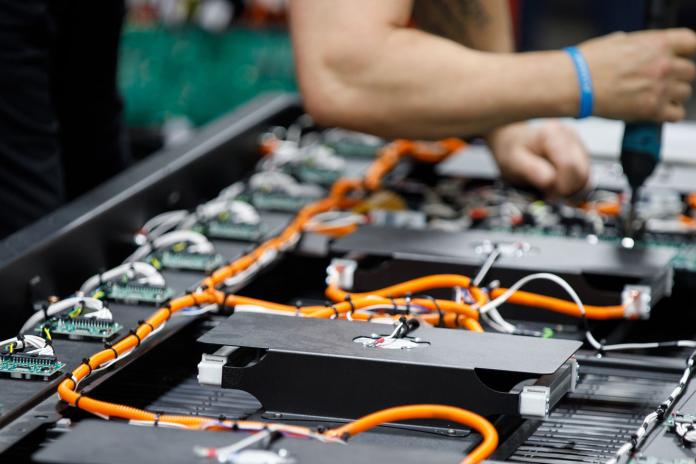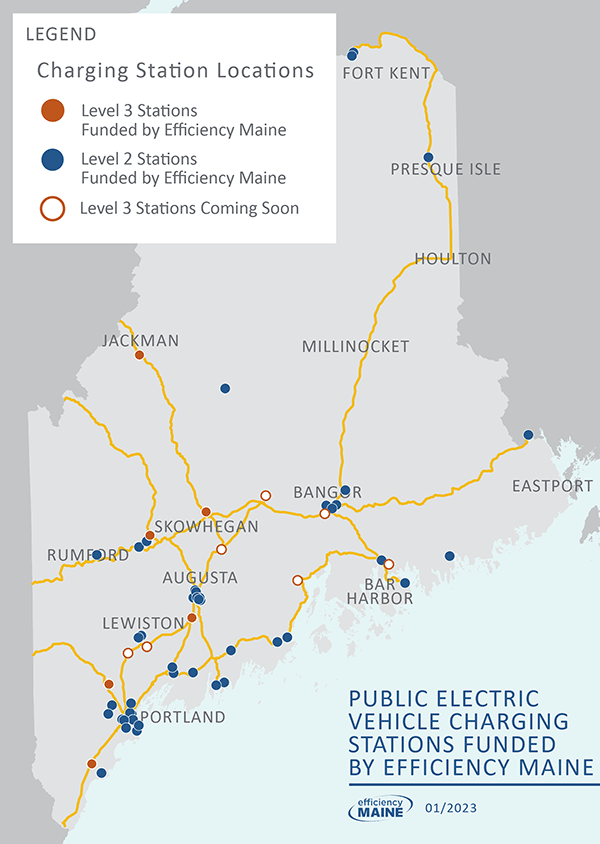Take ME to Workday
Maine students had an opportunity to ride on a Thomas Electric Bus from C.W. Cressy & Son. On the ride, which took everyone across Augusta’s Memorial Bridge to more State of Maine office buildings, students enjoyed the quiet bus ride and talked about the fact that there is no traditional engine when you open the hood. The group also learned that charging an electric bus takes about 3 hours and will ride for 150 miles on that charge. Read the full story.

Maine Clean School Bus Program
From a quieter ride to reduced emissions, electric school buses offer numerous advantages over their gas and diesel counterparts. An electric drive train has a fraction of the parts that an internal combustion bus has, leading to reduced maintenance costs and complexity. Electric school buses are much more efficient, cutting operational costs by 50% or more. They are also significantly quieter and cleaner than a diesel or gasoline bus, leading to better working and riding conditions.
Federal and state decision makers are championing the benefits of electric school buses. In 2022, the US Environmental Protection Agency (US EPA) launched the Clean School Bus Program, providing up to $5 billion in funding to schools nationwide to adopt clean transportation technology like electric school buses. The Department of Education has funding available for zero-emissions school buses under Title 20-A, §5401 (15), with the goal of 75% of all new buses purchased in 2035 being zero emissions.
Schools across Maine are bringing the benefits of electric school buses to the areas they serve. Electric school buses are being adopted in all parts of the state and in many different types and sizes of communities. The Maine Clean School Bus Program is a joint project of the Maine Department of Education, the Maine Department of Environmental Protection, and the Governor's Office of Policy Innovation and the Future.
EPA School Bus Program and Other Funding Sources
With the availability of up to over the next 5 years through the Environmental Protection Agency's new Clean School Bus Program, there is an unprecedented opportunity to accelerate electric school bus adoption in Maine and deliver cleaner school transportation to every region of the state. This generous program can fund up to 100% of the cost of an electric school bus project. The next round of funding will be available in fall of 2023.
The U.S. Environmental Protection Agency (EPA) recently announced that to support school bus electrification it has partnered with the Edison Electric Institute (EEI) and the Beneficial Electrification League (BEL) to work with school districts to facilitate communication between electric providers and school districts; provide technical support and assistance; and work together to increase funding and deployment. Additional information can be found here: Electric Sector Pledge to Support School Bus Electrification - Pledge (February 8, 2023) (epa.gov).
There are multiple funding opportunities beyond the EPA Clean School Bus Program available to Maine schools to fund electric school buses and related infrastructure. Some popular programs include:
- Maine DEP Diesel Emissions Reduction Act Funding (Buses and Chargers).
- Maine DOE School Bus Purchase Program (Buses).
- Maine DOT Charger Funding (Chargers and Installation).
- EPA Clean Heavy Duty Vehicle Tax Credit (Buses).
- EPA Alternative Fuel Infrastructure Tax Credit (Chargers).
Maine school entities do not require DOE School Bus Purchase Program approval to apply for the EPA clean bus funding opportunity or other non-DOE funding sources. School entities can receive assistance selecting the appropriate funding sources by contacting cheryl.brackett@maine.gov or by referencing the Maine Clean School Bus Program Funding Fact Sheet.
Electric School Buses Are As Safe or Safer than Fossil Fuel-Burning Buses
All school buses are designed to be safer than any other passenger vehicle type and are the most regulated vehicles on the road, required to meet more Federal Motor Vehicle Safety Standards than any other vehicle. They also have added protection from other motorists through a series of stopping laws and safety features such as flashing lights, cross-view mirrors, and highly visible coloring.
One particular area of focus is the prevention of school bus fires – also called “thermal events” – especially related to the internal combustion engines in fossil fuel-burning school buses and the batteries in electric school buses. Due to extensive safety standards, school bus fires are very rare. Bus fires, including for school buses, accounted for only 1% of all vehicle fires in 2021, none of which involved electric school buses. And there were zero bus-fire-related deaths reported to the National Fire Incident, Reporting System according to the most recent tracking.
While extremely rare, school bus fires are possible with any type of school bus. But the batteries in electric school buses are less likely to catch fire than the internal combustion engines used in diesel-burning and propane-burning school buses. In other words: according to the statistics, gasoline or diesel vehicles are more likely to catch fire than electric vehicles.
In an extensive industry survey, there were 1,529.9 fires per 100,000 gas vehicles and just 25.1 fires per 100,000 electric vehicles. Further, the National Fire Protection Association reports that two-thirds of all vehicle fire deaths result from fires that begin with flammable or combustible liquid or gas, and gasoline or diesel fuel is first ignited in more than half of all highway vehicle deaths. Electric school buses don’t have internal combustion engines or diesel or gasoline fuel, mitigating this risk entirely.
School bus drivers train students on school bus evacuations from kindergarten through grade 12. Schools are required to conduct evacuations two times per year and must keep a record of the evacuations from each bus driver. Drivers should be trained to use the same evacuation process in an SAU so that students know what they are doing no matter who is driving the bus. Whether there is a substitute driver or a trip driver, each of the students and drivers know how to get safely away from a school bus in the event of a fire or an event.

